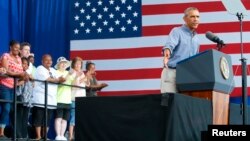As Americans celebrate the Labor Day holiday, U.S. President Barack Obama marked it by urging Congress to pass a federal increase in the minimum wage.
In a speech Monday at a Labor Day festival in the northern U.S. state of Wisconsin, Obama said states with higher minimum wages have higher job growth than states that did not raise the minimum wage.
"There is no denying a simple truth: America deserves a raise. Folks are doing very well on Wall Street. They're doing very well in the corporate board rooms. Give America a raise," said Obama.
He said all he wants is a “good deal” for Americans.
"I want an economy where your hard work pays off with higher wages, and higher incomes and fair pay for women, and workplace flexibility for parents, and affordable health insurance, and decent retirement benefits. I'm not asking for the Moon [the impossible]. I just want a good deal for American workers," the president said.
Obama is calling on Congress to increase the national minimum wage from $7.25 to $10.10 an hour.
The U.S. Labor Day holiday honors the contributions of the country's workers. It also has come to mark the unofficial end of summer in the United States.
Labor Day’s history
Marked on the first Monday in September, Labor Day became an official holiday in 1894 after a push by the nation's labor unions. For decades, cities used the occasion to stage large parades honoring unionized factory workers.
Labor unions have seen their membership fall steadily in the past 30 years, with the growth of technology and the globalization of the world economy. In 1983, 20 percent of U.S. workers were in a union compared to 11 percent in 2013.
However, over the years, unions have seen their work result in many desired benefits being enshrined in much of the U.S. workplace, including five-day work weeks as well as health care and vacations paid for by employers.
Many U.S. corporations still actively oppose unionization of their workforces. Many union members work for local, state and federal governments in white collar jobs, not in the gritty factories where the labor movement started.
The U.S. Labor Day is often celebrated as a day off from work with family picnics and outings. In some communities, it is the last day before children head back for the start of a new school year on Tuesday.





